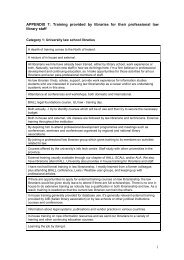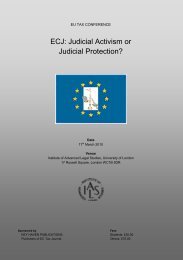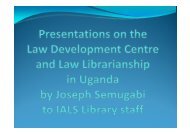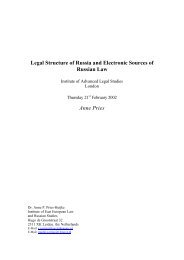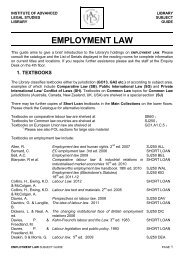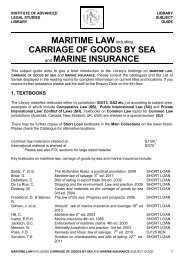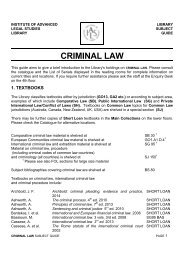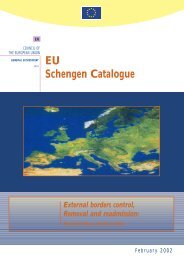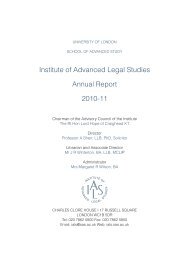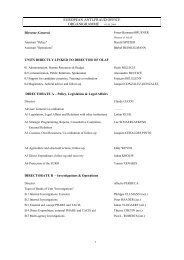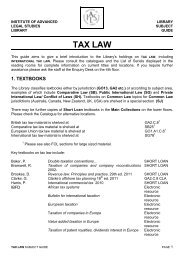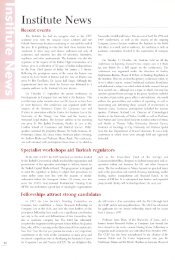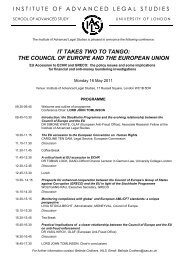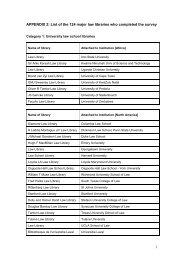a thesis - Institute of Advanced Legal Studies
a thesis - Institute of Advanced Legal Studies
a thesis - Institute of Advanced Legal Studies
You also want an ePaper? Increase the reach of your titles
YUMPU automatically turns print PDFs into web optimized ePapers that Google loves.
RULES DETERMINING INTENTION TO CREATE A TRUST. 47<br />
one creditor to another. C., a creditor, executes the deed and<br />
receives under it a payment on account. 0. is entitled to a decree<br />
for the execution <strong>of</strong> the trust. Cosser v. Radford (1863), 1<br />
De GK J. & S. 585.<br />
(b) When it is communicated to any <strong>of</strong> them who expressly or<br />
implicdly assents thereto.—In Garrard v. Lauderdale (supra], it<br />
seems to have been held that even the communication to the creditors<br />
<strong>of</strong> the fact that the trust has been made would not defeat the<br />
power <strong>of</strong> revocation, but this was dissented from in Acton v.<br />
Woodgate (supra), where Sir John Leach, M. E., says : " It appears<br />
to me, however, that this doctrine is questionable; because the<br />
creditors being aware <strong>of</strong> such a trust might be thereby induced to<br />
a forbearance in respect <strong>of</strong> their claims which they would not<br />
otherwise have exercised"; a view with which Sugden, L. 0., agreed<br />
in the Irish case <strong>of</strong> Field v. Donoughmore (1841, 1 Dru. & "War.<br />
228), where he said: "It is not absolutely necessary that the<br />
creditor should execute the deed; if he had assented to it, if he<br />
had acquiesced in it, or acted under its provisions and complied<br />
with its terms, and the other side expressed no dissatisfaction, the<br />
settled law <strong>of</strong> the Court is that he is entitled to its benefits." The<br />
same judge subsequently expressly assented to the above statement<br />
<strong>of</strong> the law by Sir John Leach in Browne v. Cavendish (1844, 1 Jo.<br />
& Lat. 635), where, however, he goes on to say: "I do not mean<br />
to bind myself to hold that in every case a representation to a<br />
creditor will give him the benefit <strong>of</strong> the trust. It must depend on<br />
the character <strong>of</strong> the representation and the manner it is acted on.<br />
On the other hand, I should be sorry to have it understood that a<br />
man may create a trust for the benefit <strong>of</strong> his creditors, communicate<br />
it to them, and obtain from them the benefit <strong>of</strong> their lying by<br />
until perhaps the legal right to sue was lost, and then insist that<br />
the trust was wholly within his power." The point was again<br />
discussed in Kincan v. Daniel (1847, 5 Ha. 493), and the statement<br />
in Garrard v. Lauderdale dissented from, although the actual<br />
decision went upon another ground; while in Griffith v. Ricketts<br />
(1849, 7 Ha. 307), it was said plainly, although again only by<br />
way <strong>of</strong> dictum, that such a deed would not be revocable against<br />
creditors between whom and the trustees such communications had<br />
taken place " as would give them an interest under the deed."<br />
The decision in Garrard v. Lauderdale, therefore, must, on this<br />
point, be regarded as overruled by the later cases. In Harland v.



